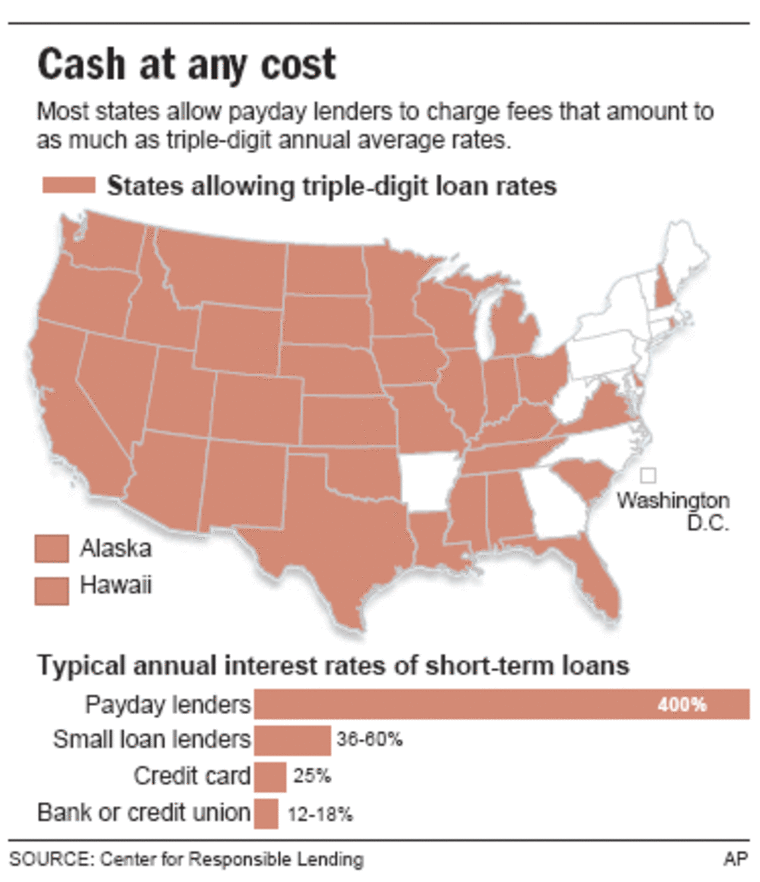Elizabeth Lawson's troubles began with an $800 electric bill, the result of a malfunctioning water heater. But it was her next move that sent her finances spinning out of control.
Lawson, who lives in the small town of Shawsville in southwest Virginia, went to a payday lending store in nearby Christiansburg. She borrowed $200, agreeing to pay a $36 charge once she received her next Social Security check.
Then Lawson, 49, began juggling, borrowing from one payday lender to help pay off the other. In 2004 and 2005, Lawson says, she and her husband had more than five loans at different payday shops, racking up fees along the way. She expects her financial problems to result in bankruptcy.
"We'd pay them off and immediately reborrow to just have money to make the house payment," said Lawson, who has several medical conditions and cares for three grandchildren. "It got to where it was just impossible to keep up."
Revolving-door loans like Lawson's have become quite common in the growing payday industry, which is permitted to charge interest at triple-digit annual average rates in about 38 states, consumer groups say.
To take out a payday loan, a borrower typically gives the store a postdated personal check that includes the fee and the principal. The lender holds the check for about two weeks or until a customer receives a paycheck or Social Security payment. At that point, a borrower can let the lender deposit the check, can repay the amount — or take out another loan, which consumer advocates say many people do.

The nonprofit Center for Responsible Lending estimates more than 90 percent of these small, short-term and high-cost loans go to repeat borrowers. In Virginia, regulators found that 85 percent of payday customers returned to the same store in the same year — some more than a dozen times.
"They set it up so you have to pay the whole thing off in two weeks, and they know you can't," said Jay Speer, executive director of the Virginia Poverty Law Center. "It's bad enough that the interest rates are 380 percent (on an annual basis), but the worst part is that they trap you."
The payday industry says its loans aren't designed to serve consumers with long-term financial needs. Instead, the lenders say they fill a void in the small, unsecured loan market by extending credit to people in a short-term crunch, perhaps due to a major car repair or medical bill.
"If you look at our target customers, they are middle-class working Americans who for whatever reason get caught between paychecks without alternatives," said Jamie Fulmer, investor relations director for Advance America, Cash Advance Centers Inc. The Spartanburg, S.C.-based company is the nation's largest payday lender.
Last year, the industry generated about $6 billion in fee revenue and $40 billion in loan volume at 23,000 stores, according to estimates from the investment firm Stephens Inc. At the six public companies alone, loan volume rose 24 percent to approximately $7.4 billion in 2005 from the previous year.
In states like Virginia, known for its business-friendly environment, the industry is clearly booming. Although surrounding states — Maryland, North Carolina and West Virginia — don't permit payday lending, Virginia opened the doors to the industry with its Payday Loan Act of 2002, which specifically authorized the lenders' high-cost loans.
Today, there are more than 750 payday stores in Virginia — or nearly two for every McDonald's. Last year, the industry made $1.2 billion in loans in Virginia, a 21 percent increase over 2004, according to data from by state banking regulators.
More disturbing to consumer groups is the growth in repeat borrowers. The state report found that the number of consumers receiving between two and 12 loans during the year rose 23 percent to about 288,700. Those receiving more than a dozen loans rose 19 percent to about 90,900.
The numbers of repeat borrowers are likely higher, because the commission doesn't count people who go to more than one payday lender during the same year.
Consumer groups have accused payday lenders of targeting low-income and military consumers by setting up offices in poor neighborhoods and near bases. But Jabo Covert, vice president of government relations for Check Into Cash Inc., disputes those claims.
Covert says the company seeks well-trafficked and suburban locations. About 5 percent of Check Into Cash borrowers in Virginia are military, he said. In addition, a typical customer has an annual salary in the $30,000 to $40,000 range but is often in a two-income household.
And customers of the Cleveland, Tenn.-based company do not stick around forever, Covert said. They might take out several loans in a year, but most are gone after 18 months. Loan defaults, he added, are in the single digits.
But consumer advocates say the lenders attract customers partly because, unlike banks and credit unions, they move fast, ask few questions and don't run credit checks. The results, they say, can be disastrous.
Rusty Boleman, whose Richmond law firm represents debtors, says his clients tell stories of payday loans that "have them on their knees." In the last several years, he says, payday loans have grown to become one of the key drivers in his clients' bankruptcies.
"The argument I hear is that (the industry) is serving an underserved community," Boleman said. "No, it isn't. They're taking advantage of poor people. They're taking advantage of people who are desperate."
Most states have enacted legislation allowing payday lenders to charge fees that amount to triple-digit annual average interest rates and that can become unmanageable if borrowers take out repeated loans.
In Virginia, payday lenders are authorized by state law to lend as much as $500 and charge $15 per $100, with a minimum maturity of a week. On average, they charge an annual rate of 386 percent. Before the state passed the Payday Loan Act, they would have been subject to a 36 percent small-loan cap — at least ideally. The lenders circumvented that rule by working with out-of-state banks.
There have been similar problems in some states with usury caps or other regulations that prohibit payday lending at triple-digit interest rates. The industry has taken advantage of a loophole in federal banking rules permitting nationally chartered banks to export interest rates from their own states to payday partners in more strictly regulated states.
However, both sides are increasingly running into resistance from state and federal regulators. North Carolina, for instance, just finished kicking out payday lenders it says have been illegally operating in the state through the so-called "rent-a-charter" relationships. On the other end, federal regulators have taken action against several banks working with payday lenders.
In Virginia, consumer advocates have unsuccessfully lobbied against payday lending. This year, a state legislator, Delegate G. Glenn Oder, proposed increasing the minimum length of loans to 15 days and prohibiting loans to consumers with outstanding payday loans. Attempts to weaken the bill were blocked by lawmakers seeking stronger regulation, and the measure never left the statehouse.
"It's an uphill struggle once you have an industry entrenched in the state," said Jean Ann Fox, consumer protection director for the Consumer Federation of America.
